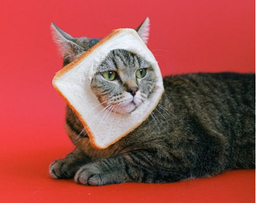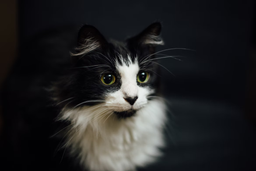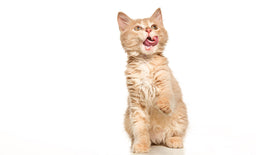The basic principles of Maine Coon kitten food
From Maine Coons’ meek demeanour and vocal meowing to their fluffy fur—there’s a lot to love about these gentle giants. Maine Coons are a popular breed with many distinctive traits, but does that uniqueness affect their dietary habits? Does your kitten require tailor-made meals to thrive? Let’s look into different types of Maine Coon kitten food that can best fulfil their nutritional needs.
Why stop at kittenhood? We’ll also explore the most beneficial dietary plans for the adult long-haired feline and discuss the defining characteristics of the breed. You’ll learn about the most common health issues your beloved Maine Coon can experience and find out how regular servings of high-protein meals can keep them healthy and happy. Get all the kitten facts you need here!
Do Maine Coons need a special diet?
Regardless of their breed, all cats need the following nutrients to live a long and healthy life:
- Animal protein
- Healthy fats
- Amino acids
- Natural vitamins (especially vitamin B complex)
- Natural minerals (zinc, magnesium, and potassium)
The recommended protein intake for most cat breeds amounts to 30% per day, but Maine Coons are not your average house cat. Because of the large frame and high energy levels, their dietary needs are specific. Most vets recommend protein-based meals packed with amino acids, such as taurine and arginine, for the long-haired feline.
Besides being an important energy source, amino acids benefit your gentle giant’s health in numerous ways. Taurine positively affects the feline:
- Heart
- Digestive tract
- Vision
- Overall immune response
While your cat’s breed can help you determine their natural feeding pattern more accurately, it’s only the starting point. Other factors you should look into when choosing the perfect Maine Coon cat diet are:
- Age
- Activity level
The appropriate nutrient ratio for kitten, adult, and senior Maine Coons varies depending on their distinct metabolism and energy requirements.
There are some general guidelines every cat parent should follow. For example, vegetable proteins can never replace animal proteins because their bioavailability for cats is too low, meaning your Maine Coon is not meant to be a vegan.
What’s the best Maine Coon kitten food?
Kittenhood is the most active period in a feline’s life, so they need high quantities of protein and calcium to help them grow. A healthy kitten diet should be based on the following parameters:
|
Nutrient |
The overall effect |
Recommended daily intake |
|
Protein |
Assists muscle development |
Min. 50% |
|
Fat |
Provides energy and keeps the kitten active |
Under 20% |
|
Calcium |
Sustains bone structure and growth |
0.8–1.6% |
During the first eight to ten weeks (i.e., until they grow their first set of teeth and start weaning), kittens get most nutrients from breast milk. There are also man-made alternatives for foster cats, such as the kitten replacer formula (KMR). KMR is similar to cat’s milk in terms of nutritional value and is the only suitable substitute.
Don’t feed your kitten store-bought or fresh milk since they won’t be able to digest it! The lactose content is too high for their sensitive stomach and can cause diarrhoea and other gastrointestinal issues.
Maine Coons grow slower than other breeds, becoming fully developed when they’re three to five years old, while other cats tend to reach their full size at the age of two. That’s why most vets recommend sticking to the following meal plan when it comes to this long-haired feline:
|
0–5 months |
● Cat milk ● Kitten replacer formula (KMR) |
|
5–12 months |
● Wet and dry kitten food ● KMR (as a supplement) |
Try not to get swayed by the slow development and overfeed your Maine Coon. It’s best to stick to the recommended daily intake for kittens. Otherwise, you risk causing a slew of chronic health issues, such as:
- Diabetes
- Obesity
- Kidney and liver disease
Don’t forget to monitor your cat’s appetite as they approach adulthood. If your kitten is nibbling on grass after each meal, it might be time to increase the portions or switch to adult Maine Coon cat food.
What do Maine Coon cats eat once they reach adulthood?
As your feline companion matures, they lose some of their signature kitten vigour. Even with decreased energy levels, Maine Coons remain fairly active throughout their lives, which is why they require high levels of protein.
A personalised Maine Coon diet will keep your cat’s spirits up by sustaining their:
- Tissue development
- Metabolism regulation
- Tendons and muscles repair and growth
- Weight management
If you plan to prepare the food yourself, it’s best to serve single-source protein meals. You should use high-quality meat as the basis of your homemade dishes, such as:
- Poultry (chicken and turkey)
- Fish (tuna, sardines, salmon, and even shrimp)
- Lamb
Remember to thoroughly cook the food before serving. Contrary to popular belief, raw meat contains various bacteria that can be harmful to the feline digestive tract.
You can incorporate some treats into their diet, but make sure they don’t take up more than 3% of the daily meals.
Maine Coons approaching their golden years are more likely to experience various health problems, including dental issues and hip dysplasia. They also have less active lifestyles, so it’s necessary to cut down on their portion size.
To maintain the optimal protein, fats, and vitamins ratio while controlling the portions, it’s best to use the combination of high-quality canned food and cat kibble.

Keep the good food coming, hooman!
Source: Sergei Wing
Canned goods vs. kibble—which is the best food for Maine Coons?
Maine Coons come from a long line of feline hunters, and their strong jaws and sharp teeth are the evolutionary testaments to that. It’s widely accepted that high-quality dry food is a necessary ingredient in the Maine Coon cat diet.
Not only does the kibble encourage your long-haired feline to chew and strengthen their mighty mandible, but it also helps maintain oral hygiene. The rugged texture of dry food cleans the plaque buildup and prevents dental diseases, such as gingivitis.
Keep in mind that a diet solely based on cat biscuits can lead to several chronic health conditions, such as:
- Dehydration
- Hypertension
- Diabetes
- Heart disease
- Urinary tract disease
- Various skin conditions
While it’s good for your pet’s teeth, cat kibble lacks the moisture content necessary for their health. Like other felines, Maine Coons are not prone to drinking water and must hydrate through their meals.
Wet cat food generally has a high water content (e.g., most commercial products contain 78% moisture). While slightly more expensive, it’s usually rich in animal protein and natural minerals like zinc, iron, and biotin. The key benefits of feeding your feline canned food include:
- Increased hydration—The moisture from wet canned food can prevent acute kidney and bladder problems and digestive issues
- Lean muscles—High protein levels will maintain the musculature needed for Maine Coon hijinks while reducing the risk of injury
- Variety—Feeding your cat wet food will bring variety to their diet and potentially solve the “fussy eater” syndrome
You can combine gravy or jelly canned products, or even home-cooked cat soup and broth, with cat biscuits to optimise your Maine Coone cat’s diet!
Enrich your Maine Coon cat’s diet with delicious and healthy Untamed meals!
If you’re on the hunt for high-protein products to nourish your long-haired pawster, Untamed food is the cat’s pyjamas! Our delicious meals can improve your pet’s health with:
- Hypoallergenic, human-grade ingredients
- Ethically-sourced premium meat cuts
- Vet-approved formulas
A single serving of Untamed food has twice the amount of animal protein and amino acids than most commercial canned goods! All meals are steamed gently and tightly packaged to maintain the optimal nutritional value. You’ll find no additives or artificial flavours in our recipes.
Our delicious products are ready to serve upon arrival, so there’s no need for additional preparation on your part. The portions are purrfectly balanced to keep your Maine Coon cat’s weight in check.
Untamed recipes are unmatched in both variety and aroma. If you become a member of our kindle, you can treat your feline companion to such delicacies as:
- Tuck-in Tuna with Shrimp in Gravy—58% tuna whole meat, 33% fish broth, 5% shrimp
- Chocka Chicken in Jelly—58% chicken breast, 33% chicken broth, 5% chicken liver
- Chocka Chicken with Ham in Gravy—55% chicken breast, 33% chicken broth, 5% ham
- Full-on Fishy in Gravy—45% tuna whole meat, 33% fish broth, 13% sardine, 5% mackerel
Check out more of our delicious recipes by filling out an online questionnaire and getting a starter pack!

Single-sourced meals with irresistible aroma!
Image (c) Untamed
What are the health benefits of Untamed products?
The immediate effects of switching to Untamed food can be seen within the first week. Your kitty will have:
- Regular bowel movement
- Optimal energy level
After the initial boost, you can expect long-term benefits, including:
|
What to expect |
The Untamed effect |
|
After two months |
● Decreased shedding ● Shinier and thicker fur ● Healthy and smooth skin |
|
Within four months |
● Fewer hairballs ● Optimal weight ● Lean muscle tone |
|
In the long run |
● Stable gastrointestinal health ● Regulated metabolism ● Fewer dental issues ● Kitten-like energy throughout all nine lives! |
That sounds pawsitively amazing! Where do I sign up?
You can start treating your beloved pet to high-quality cat food right now! Sign up for a trial box with as many as 12 delicious meals and let your feline companion be the judge. All you have to do is visit our online cat food store and complete these simple steps:
- Take the Try Now online quiz
- Evaluate the recommended meal plan
- Confirm your order if all looks good
Your starter pack is created based on the provided information, i.e., your cat’s tastes, sensitivities, and life stage. If you’re happy with the proposed diet, you can expect your Untamed box to arrive shortly.
The final decision is left to your four-legged friend! You’re also free to change the initial order and adjust the cat food subscription plan according to your (kitty’s) wishes.

Treat your cat like royalty with Untamed products!
Image (c) Untamed
How much should I feed my Maine Coon?
When compared to other breeds, Maine Coons have higher nutritional needs. It’s not because they’re particularly gluttonous (on the contrary), but because they’re the largest domesticated cat in the world! The average weight of an adult Maine Coone is between 5 and 8 kilograms.
Besides their imposing physique, they’re also a fairly active feline, meaning they require more calories in their diet. To keep your pet in tip-top shape, it’s best to have a mixed diet of kibble and canned goods. Take a look at the table below for the recommended portion sizes:
|
Food type |
Recommended daily intake |
|
Dry food |
55–70g |
|
Wet food |
Around 85g |
The table is meant as a general guideline since your cat’s nutritional needs are susceptible to change. For example, pregnant cats require up to three times more nourishment to sustain the litter in their belly.
You know your feline companion better than anyone, so you should monitor their eating habits closely. If you notice your cat is leaving most of the food in the bowl, it can mean they:
- Don’t enjoy the food
- Dislike the bowl shape
- Feel anxious or stressed
- Suffer from an underlying health condition
Food to avoid in your Maine Coon cat diet
Being carnivorous, cats are not fit to digest high levels of carbohydrates. Since Maine Coons are especially susceptible to diabetes, they should steer clear of sugary products.
Here’s a list of other potentially harmful food items to avoid:
- Chocolate—Any food or liquid containing caffeine can cause heart palpitations, tremors, and breathing difficulties. Too much chocolate or cocoa leads to caffeine poisoning, which can damage your cat’s heart
- Dairy products—Since most cats are lactose intolerant, they shouldn’t drink milk outside the nursing period because it causes stomach problems. Other dairy products such as cheese are also off limits
- Raw meat and eggs—Unless they snag a house mouse to show off their hunting prowess, indoor cats shouldn’t consume raw food. It contains various dangerous bacteria such as salmonella, Escherichia coli, and listeria, along with other parasites like Toxoplasma gondii and Sarcocystis
- Grapes and raisins—Because of the high sugar content in grapes and raisins, you shouldn’t give them to your Maine Coon. Frequent consumption (even as a treat) can lead to indigestion and kidney failure
- Citrus—The citric acid in oranges, lemons, and clementines is too strong for your cat’s kidneys. It can also give them an upset tummy
- Allium vegetables—Onions, garlic, and chives are a big no-no! The tiny amount of powdered onion found in some commercial cat food is the absolute maximum a cat can take
As for corn, barley, rice, oats, rye, wheat, and other types of grain, they’re not harmful per se. The by-products of grain such as gluten and starch can sometimes lead to food allergies, but only in cases of overconsumption. While unnecessary for a cat’s diet, grain-based cat food won’t harm your Maine Coon.
Maine Coon cat defining characteristics
Let’s put all the food talk aside and take a look at some recognisable traits of these gentle giants:
- Appearance—The long-haired feline can come in all colours, most notably white, tortoiseshell, and tabby. Their eye colour ranges from green to gold, with the occasional shade of blue. Heterochromia is also quite common
- Temperament—Maine Coons are goofy and affectionate by nature! Their friendly demeanour is what earned them the nickname “gentle giant.” The breed is incredibly responsive to training and performs well in a clowder
- Average height and weight—Adult males can weigh up to 11 kilos and reach a whopping 41 cm in height! Female Maine Coons are also quite robust, with an average weight between three to four and a half kilos
- Shedding—Perhaps the most recognisable characteristic of this breed is their beautiful, feathery fur. With a glossy top coat and a thick undercoat, Maine Coons require a lot of grooming. Interestingly enough, they shed as much as the next feline, i.e., the amount can vary from cat to cat

Maine Coons are majestic creatures!
Source: Lina Angelov
Most common Maine Coone health problems
Each cat breed comes with a different set of genetically predisposed health problems. Despite their sturdy appearance, Maine Coons can develop several serious conditions throughout their lives. You should be on the lookout for:
- Diabetes—Adult Maine Coons are prone to diabetes, so you should exclude carbohydrates from their diet
- Hypertrophic Cardiomyopathy—This is a common heart disease among cats. When cats eat too much sugar, the heart wall thickens, causing increased heart rate and other dysfunctions. Hypertrophic Cardiomyopathy can ultimately lead to cardiac arrest
- Polycystic kidney disease (PKD)—Kittens born with PKD develop multiple cysts on their kidneys that can increase in size and eventually multiple if left untreated. The condition can go undiagnosed for years since the first symptoms often don’t show up until the cat is seven years old
- Dental disease—Maine Coons are prone to dental plaque buildup. The excess can lead to various problems, such as gingivitis and tooth resorption
- Spinal muscular atrophy—It’s one of the more serious inherited conditions. Spinal muscular atrophy affects the skeletal muscles in your cat’s lower body, causing deformation. Felines who show symptoms of the disease have a shorter lifespan (approximately eight to nine years)
- Hip dysplasia—The inherited orthopaedic condition affects the cat’s joints, limiting their movement and keeping them from sitting properly
The good news is most of these afflictions can be preempted with a high-protein Maine Coone cat diet!

![Best food for Ragdoll cats in the UK [Broken Down]](http://untamed.com/cdn/shop/articles/featured_best_food_for_ragdoll_cats_uk.jpg?v=1646818249&width=256)

